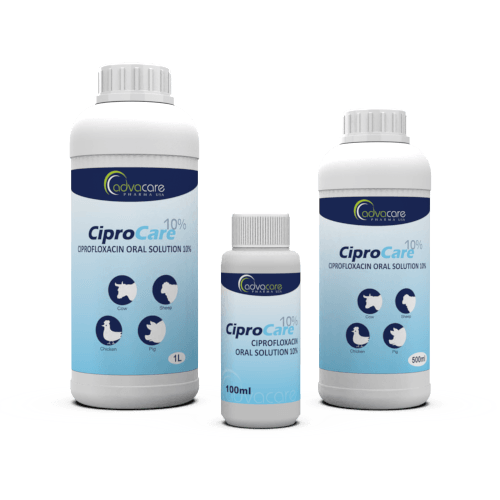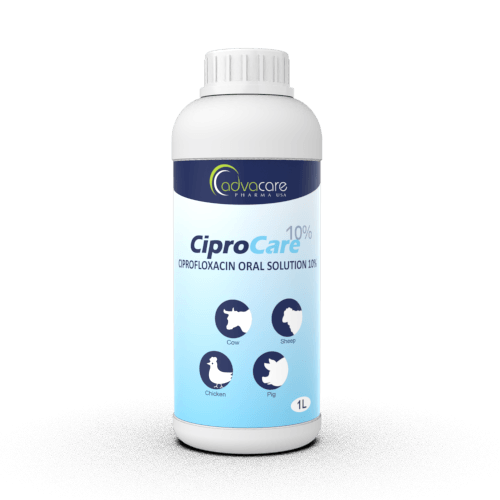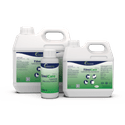- Home›
- Veterinary Pharmaceuticals›
- Veterinary Solutions and Suspensions›
- Veterinary Oral Solutions›
- Ciprofloxacin Oral Solution
Ciprofloxacin Oral Solution
Dosage
Packaging
What is Ciprofloxacin?
Active Ingredients: Ciprofloxacin
Ciprofloxacin Oral Solution is a fast-acting antibiotic drug used to treat infections in dogs, cats, poultry, and livestock like cows, goats, sheep, and pigs. It is commonly used to treat infections of the urinary tract, skin, or respiratory system. Ciprofloxacin is effective for gram-negative and gram-positive bacteria.
Ciprofloxacin is a fluoroquinolone antibiotic. It works by interfering with the enzymes responsible for DNA replication, which stops protein synthesis. Ciprofloxacin displays bactericidal activity against a broad spectrum of microorganisms, including Pseudomonas aeruginosa, Klebsiella, E. coli, Enterobacter Salmonella, and Proteus.
As a synthetic antimicrobial derived from Quinolone carboxylic acid, ciprofloxacin is employed for controlling intestinal infections in production animals. Quinolones, including ciprofloxacin, possess amphoteric properties and generally exhibit low water solubility within the pH range of 6–8. While the full impact on therapeutic efficacy is not entirely understood, these drugs function as weak bases, showing reduced effectiveness in acidic urine pH compared to non acidic conditions. In concentrated acidic urine, some quinolones may form needle-shaped crystals. Typically, quinolones intended for oral or parenteral administration include freely soluble salts in stable aqueous solutions. The primary method of administering Ciprofloxacin is orally, with a bioavailability exceeding 80%; however, in cattle, it ranges from 0-20%. Administration after food consumption may affect drug efficacy.
Regarding distribution, ciprofloxacin demonstrates excellent penetration of all tissues due to its high lipid solubility, with tissue concentrations consistently surpassing plasma concentrations. Elevated concentrations are observed in elimination organs like the kidneys, liver, and bile. Ciprofloxacin can also be detected in prostatic fluid, bone, ocular fluid, endometrium, and cerebrospinal fluid. The drug crosses the placental barrier.
Ciprofloxacin is primarily eliminated unchanged or partially metabolized, with renal excretion through glomerular or tubular secretion. Urine concentrations remain high 24 hours after the last administration.
The medication's activity is attributed to DNA gyrase inhibition, preventing DNA supercoiling. Notably, ciprofloxacin's efficacy is concentration-dependent, and a once-per-day treatment regimen is sufficient.
It is important to note that this drug is for veterinary purposes only. Ciprofloxacin Oral Solution should be prescribed by a veterinary doctor or animal care specialist for an animal.
This drug is also available in the form of injection and soluble powder.
AdvaCare Pharma is the producer and exporter of CiproCare™ Ciprofloxacin Oral Solution. This veterinary medicine is produced in our facilities in China, India, and the USA. We regularly audit our manufacturing factories to ensure they meet the rigorous standards for GMP certification.
Why are we a quality Ciprofloxacin manufacturer?
AdvaCare Pharma, an American company, is a quality manufacturer of Ciprofloxacin Oral Solution for veterinary use. We are committed to the manufacture and global distribution of over 250 GMP-certified veterinary medicines, including 70+ oral liquid formulations.
As a trusted Ciprofloxacin manufacturer, our approach to supply chain management is systematic and data-driven. We provide unparalleled support to our veterinary distributors, assisting with document and product registration, supply chain coordination and market share growth.
Uses
What is Ciprofloxacin used for?
It's used to treat bacterial infections such as:
- mycoplasma pneumonia
- pneumonia
- pasteurella disease
- colibacillosis
- salmonellosis
- streptococcus
- actinomycetes
- mastitis
What animals can be treated with Ciprofloxacin Oral Solution?
This medicine is recommended for dogs, cats, poultry, and livestock like cows, goats, sheep, and pigs.
How is Ciprofloxacin Oral Solution used?
This medicine has been manufactured as a liquid, which is intended to be administered orally.
How does Ciprofloxacin Oral Solution help animals?
This fluoroquinolone antibacterial drug has a broad spectrum, and it is a systemic antibacterial agent. It is approved for both dogs and humans. Due to its synthetic derivation, it is very effective against many resistant bacteria to older antibiotics. In all animals, it functions by damaging the bacterial DNA and reaches most infection sites. The susceptible bacteria die very quickly, and it is a good choice for many local and systemic infections. The usage of this antibiotic should be limited and should be applied only when necessary. It should be only used for treating severe bacterial infections that are resistant to other antibiotics. Improper usage of this antibiotic can prevent many other drugs from working.
Which diseases can be targeted by Ciprofloxacin Oral Solutions?
Ciprofloxacin in animals is effective against the following:
- pneumonia
- endocarditis
- meningitis
- septic arthritis
- prostatitis
- skin and soft-tissue infections
- wound sepsis
- intra abdominal abscess
- sinusitis
- urinary tract infections
- gastroenteritis
- Pseudomonas septicemia
- empyema
- intracellular pathogens
How can Ciprofloxacin Oral Solution help in respiratory infections?
This medication demonstrates efficacy against gram-positive and anaerobic bacteria affecting the respiratory tract, leading to a reduction in symptoms such as nasal discharge, fever, and breathing difficulties. The recommended treatment duration is 4-6 weeks.
Ciprofloxacin is also beneficial in addressing pyothorax. Successful treatment involves the removal of septic exudate from the chest, allowing the antibiotic to take effect. After 10-14 days, further treatment decisions should be made by the veterinarian.
Studies suggest that fluoroquinolones, including ciprofloxacin, can effectively treat feline infectious anemia. Additionally, it proves useful in managing rapidly growing mycobacterial infections.
Achieving high concentrations of this drug can expedite recovery as it may overwhelm bacterial resistance mechanisms.
What is the withdrawal period for Ciprofloxacin?
The withdrawal period is 12-15 days. The exact duration will depend on local regulations.
Dosage
How much Ciprofloxacin Oral Solution should be given to poultry?
The usual dose is 10-15mg/kg, given every 12 hours.
The dosage depends on the animal’s species, weight, age, and other individual characteristics. It also depends on the animal's current health condition.
Refer to a veterinary doctor or pharmacist for guidelines on dosage.
Side Effects
As with all pharmaceuticals, some unwanted effects can occur from the use of Ciprofloxacin Oral Solution.
Some common side effects may include but are not limited to: • gastrointestinal effects (appetite loss, vomiting, diarrhea)
If you notice any of these side effects, contact a veterinarian as soon as possible.
Short-term usage of Ciprofloxacin can also lead to some adverse effects. However, potential serious side effects may include allergic or hypersensitivity reactions. The most common side effects related to hypersensitivity are skin rash, fever, facial swelling, or difficulty breathing. Additionally, common side effects encompass vomiting, diarrhea, and the risk of potentially fatal antimicrobial-induced colitis.
Acute retinal degeneration is observed in cats, with the manifestation of concentration-dependent risks heightened, especially in the presence of renal disease. This is manifested in vision changes in cats, and it is a serious side effect.
Neurotoxicity is another adverse effect of this antibiotic and it is due to the gamma-aminobutyric acid (GABA) receptor antagonism. Antimicrobial-induced colitis and hemolytic anemia can also be detected in some cases.
This antibiotic is not recommended for pregnant animals because it can lead to embryonic loss and maternal toxicity. High doses in companion animals can lead to cartilaginous erosions and permanent lameness.
For a comprehensive list of all possible side effects of this medication, consult a veterinarian.
Precautions
Do NOT use Ciprofloxacin Oral Solution for an animal that:
- has a known allergy or hypersensitivity to any of the ingredients.
- is young and still growing, as ciprofloxacin may cause cartilage abnormalities.
Treatment with this drug should be administered with caution if an animal:
- is dehydrated.
- has hepatic or renal insufficiencies.
- is pregnant or lactating.
There are known interactions between ciprofloxacin and other drugs, including antacids, sucralfate, cyclosporine, iron/zinc, methotrexate, quinidine, and theophylline.
This drug should not be used with dairy products because the efficacy will be reduced.
If the animal has recently been treated with other antimicrobial drugs, it shows reduced efficacy.
DO NOT use this drug with cimetidine, cyclosporine, or theophylline.
The effectiveness of this drug in monogastric animals can be diminished by the presence of food. The bioavailability may also be reduced through chelation when administered concurrently with antacids containing magnesium and calcium.
Lower doses are recommended for animals with kidney failure, as the primary elimination route for the drug is through urine.
Wearing gloves is advisable when handling this product, as it can cause irritation to the eyes and skin. In case of contact with eyes or skin, immediate washing is recommended.
It is essential to keep this product out of reach of both children and animals.
What are the most common animals for which Ciprofloxacin Oral Solution is used?
Ciprofloxacin Oral Solution is primarily utilized for the treatment of bacterial infections in companion animals, poultry, and livestock. The specific common uses of Ciprofloxacin Oral Solution include the treatment of the following:
- E. coli
- Salmonella
- Klebsiella
- Enterobacter
- Proteus
- P aeruginosa
- Brucella spp.
- Rickettsia
- Chlamydia
- Mycoplasma
- Streptococcus spp.
- Enterococcus faecium
- Enterococcus faecalis
Poultry Bacterial Infections
Ciprofloxacin is utilized in the treatment of severe bacterial infections in poultry. It plays a role in managing gram-negative bacteria, including Enterobacter, E. coli, Klebsiella, Pasteurella, Proteus, Salmonella, and sometimes Pseudomonas.
Companion Animals Bacterial Infections
This antibiotic is most commonly used for treating urine, skin, and gastrointestinal infections in animals. It is also a first-choice antibiotic in cases of respiratory infections in animals. This antibiotic can also help in treating prostatitis and pyelonephritis.
Ruminants (Sheep, Cow, and Goat) Bacterial Infections
This drug is effective against many respiratory, urinary, and gastrointestinal tract infections.
Resistance to this antibiotic is prevalent, but combining it with other drugs can broaden the spectrum and improve efficacy against various gram-negative and gram-positive bacteria. The decision to use this combination should be made by veterinarians based on the animal's current health status and antibiogram results.

You might be interested in...
Why AdvaCare Pharma?
As an industry leader, we are aware of our responsibility to provide affordable and sustainable solutions to improve healthcare worldwide.











